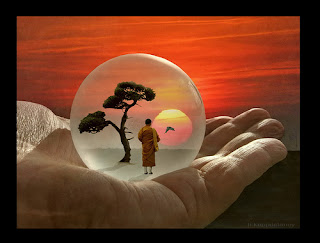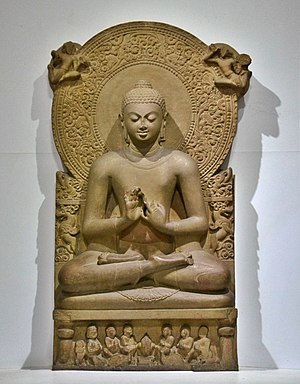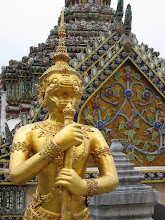ျမန္မာနိင္ငံနွင့္ နယ္နိမိတ္ခ်င္ဆက္စပ္ေနေသာ မဲေဆာက္ျမိဳ့ ျမန္မာနိင္ငံသား အမ်ားဆံုးေနထိုင္ေသာ ထိုင္းနွိုင္ငံရဲ့ နယ္စပ္ျမိဳ့တစ္ျမို့ျဖစ္ပါတယ္ . ၂၀၁၁ စာ၇င္းေကာက္ခ်က္ရ မဲေဆာက္ တြက္ ျမန္မာ နိင္ ငံသား ရွစ္ဆယ္ငါး(၈၅%)၇ာခိုင္းနဳးန္ ရွိေၾကာင္း လူအခြင့္ ေ၇း ေစာင့္ၾကည့္အဖြဲ့တစ္ခု ရဲ့ စာရင္းဇယား အရ သိရပါေၾကာင့္ ၊
ထို့အျပင္ ျမ၀တီးမွ ေနျပီးျမန္မာ နိင္ငံသားမ်ားသည္ ေနတိုင္းလို့လို့ေစ်းသြားေစ်းလာေတြ အခက္ခဲ့မရွိ သြားလာေနသည္ကိုလည္ ေနတိုင္းလိုလို့ေတြ့ျမင္ေနရပါသည္ ။ မဲေဆာက္ကေနျမ၀တီသို့သြားလွ်င္လည္ လြယ္လြယ္ကူးကူး ပါပဲ ထိုင္ဘတ္ ၂၅၀ ခန့္ကုန္ရံုျဖင္ ျမန္မာ နိင္ငံသို့ေ၇ာက္နိင္ပါတယ္.
ဒါက ယခု လက္တစ္ေလာ ျဖစ္ေပၚေနေသာ အေျခေနပင္ျဖစ္ပါေၾကာင့္တင္ျပလုိက္ရပါသည္။
| The enlighten One "Buddha" and "Gautama" redirect here. For other uses, see Buddha (disambiguation) and Gautama (disambiguation).
Gautama, also known as Śākyamuni ("Sage of the Śākyas"), is the primary figure in Buddhism, and accounts of his life, discourses, and monastic rules are believed by Buddhists to have been summarized after his death and memorized by his followers. Various collections of teachings attributed to him were passed down by oral tradition, and first committed to writing about 400 years later........read more at wikipedia REF:wikipedia | |||||||||||||||||||||||
In the West, the term Eastern philosophy refers very broadly to the various philosophies of "the East," namely Asia, including China, India, Japan, Persia and the general area. One must take into account that this term ignores that these countries do not belong to a single culture.
 |
| life is suffering |
Ancient eastern philosophy developed mainly in India and China. Hindu philosophy primarily begins with Upanishads, which can be dated around the middle of the first millennium BC.
The oldest, such as the Brhadaranyaka and Chandogya Upanishads, have been dated to around the 8th century BCE. The philosophical edifice of Indian religions viz., Hinduism, Jainism, Buddhism is built on the foundation laid by the Upanishads. Hindu philosophy is followed by the Buddhist and Jain philosophies. Confucianism can be considered as the oldest school of philosophy in China.[citation needed] Confucianism developed in China around the same time as Buddhism and Jainism developed in India. Another school of philosophy, Taoism, developed in China around 200 BC.RFE: wikipedia
 |
| Philosophy mean wondering |
The 20th century deals with the upheavals produced by a series of conflicts within philosophical discourse over the basis of knowledge, with classical certainties overthrown, and new social, economic, scientific and logical problems. 20th century philosophy was set for a series of attempts to reform and preserve, and to alter or abolish, older knowledge systems. Seminal figures include Ludwig Wittgenstein, Martin Heidegger, Bertrand Russell, Jean-Paul Sartre, and Edmund Husserl. Epistemology, the theory of knowledge, and its basis was a central concern, as seen from the work of Heidegger, Russell, Karl Popper, and Claude Lévi-Strauss. Phenomenologically oriented metaphysics undergirded existentialism (Sartre, Maurice Merleau-Ponty, Albert Camus) and finally poststructuralism (Gilles Deleuze, Jean-François Lyotard, Michel Foucault, Jacques Derrida).
Pragmatist Richard Rorty has argued that these and other schools of 20th century philosophy, including his own, share an opposition to classical dualism that is both anti-essentialist and antimetaphysical. The psychoanalytic work of Sigmund Freud, Jacques Lacan, Julia Kristeva, and others has also been influential in contemporary continental philosophy.
A notable phenomenon of the latter half of the century was the rise of popular philosophers who promulgated systems for dealing with the world but were isolated from academic philosophy, such as Ayn Rand, who were radical critics of traditional philosophy and psychology and relied on unorthodox methods. Conversely, some philosophers have attempted to define and rehabilitate older traditions of philosophy. Most notably, Hans-Georg Gadamer and Alasdair MacIntyre have both, albeit in different ways, revived the tradition of Aristotelianism.
The 21st century's philosophy is difficult to clarify due to the short span of time that has lapsed since the start of the new millennium. Only nearly one decade has passed since its beginning, however it is usually seen as being defined by the prominent 20th century philosophers who still survive today. These include the likes of Noam Chomsky, Saul Kripke and Jürgen Habermas, whose work as professors and educators in the field of philosophy have allowed them to reach prominence in the mainstream media. The 21st century continues to carry with it much of the philosophical debate seen in the former one, with continental and analytic traditions still reigning in major debate. A variety of new topics, however, have risen to the stage, resurrecting ethics into the modern philosophical discussion. For instance the implications of new media and information exchange, such as the Internet, have brought back interest in the philosophy of technology and science.
Eastern philosophy
REF:wikipediahttp://en.wikipedia.org/wiki/The_History_of_Philosophy#Modern_philosophy
 |
| Philosophy is love of wisdom |























